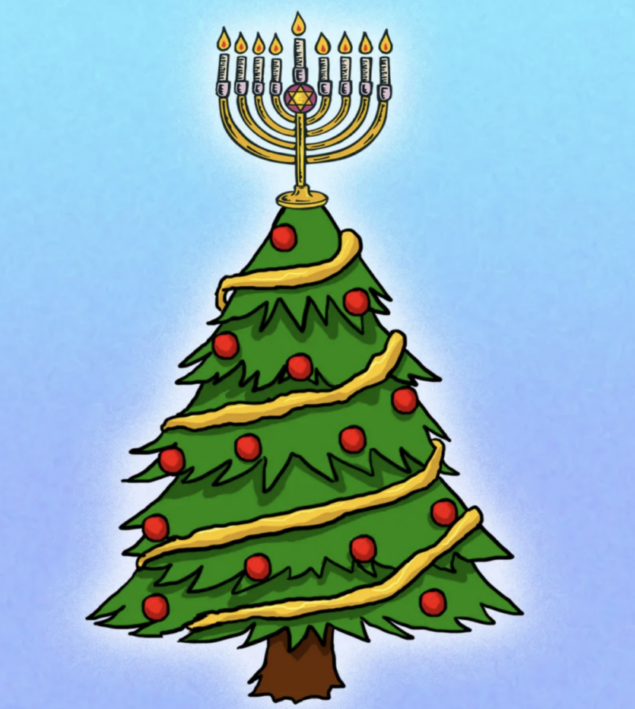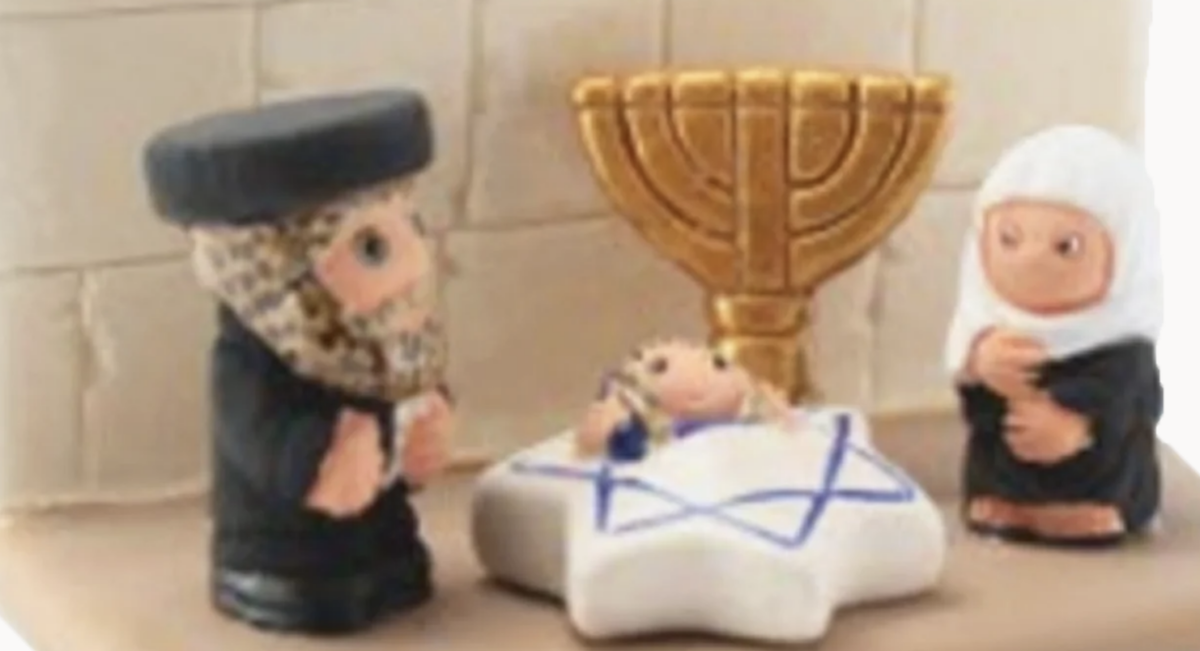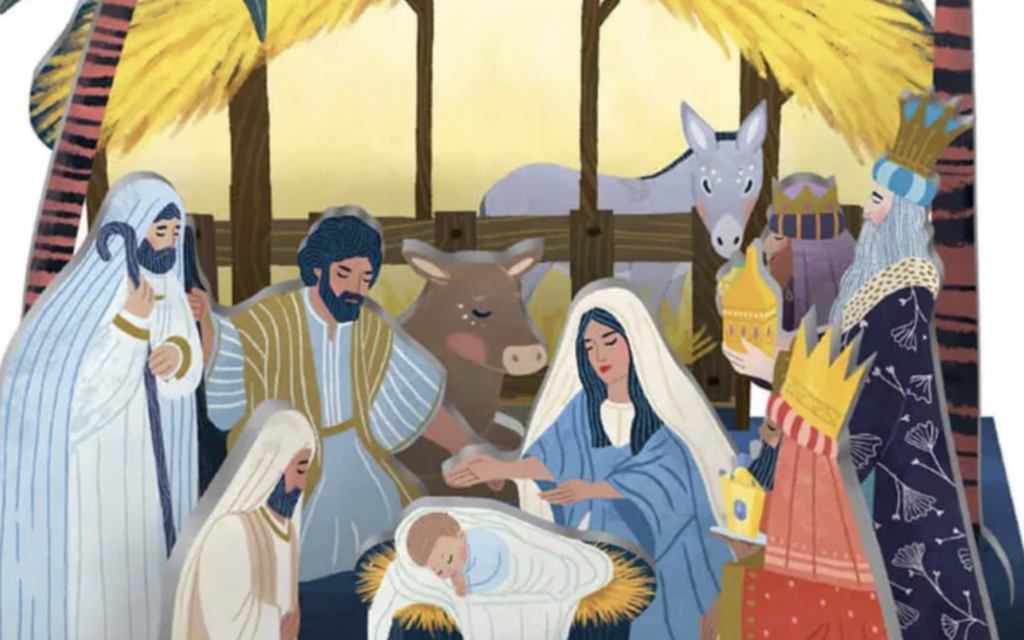The Nativity: A very Jewish affair
Christmas may not be our holiday, but it's part of our history like it or not
The Festival of Lights is over and whether or not you celebrate Christmas, it’s coming. Since 1900, the first night of Chanukah has fallen on Christmas Eve three times, 2016 being the most recent. This calendar clashing is of benefit only to those who like to blend the two and deck the halls with chanukiahs and mistletoe for Chrismukah.
Shameful I know, but I am a repeat offender as I was raised with a lit shamash in one hand and a letter to Santa in the other. Sending my daughter to a Jewish school certainly turned the heat up under the chanukiah as she made a new one every year, but this did not diminish my love for latkes and lebkuchen. And why should it?
We live in a Christian country, where Christmas – with tinsel, fairy-lit fir trees and the latest John Lewis advert – is ‘never knowingly undersold’. But there’s more to the holiday than pulling crackers. There’s Jesus who was Jewish, through the tribe of Judah.
Get The Jewish News Daily Edition by email and never miss our top stories Free Sign Up
Of course, the colour of his skin will always be up for dispute, but the fact that he was Jewish is universally acknowledged by those who believe/take their lead from/have any interest in the Bible or favour the accuracy of the Annals of Imperial Rome, written by first-century historian Tacitus.
 Lord Lloyd-Webber and Tim Rice sparked my initial interest in Jesus with their ‘70s musical and I know the entire score, but it was studying Classics and Tacitus that confirmed his existence.
Lord Lloyd-Webber and Tim Rice sparked my initial interest in Jesus with their ‘70s musical and I know the entire score, but it was studying Classics and Tacitus that confirmed his existence.
In the past few days Jesus has been trending on X (Twitter) because of a sermon by the Rev Dr Munther Isaac, who leads the congregation at the Evangelical Lutheran Church in Bethlehem. At his church, the pastor has replaced the traditional wooden crib of the nativity scene with rubble, on which the baby – a toy doll – lies in the grotto. The Rev Isaac created this sorrowful scene in solidarity with the children killed in Gaza, and I sympathise.
The historic city in the occupied West Bank is synonymous with the birth of Jesus, but this year its Christian leaders made a unanimous decision to cancel public celebrations. So no Christmas tree in Manger Square, no Santas on street corners and no Christian tourists.
But Munther’s crib got traction on the platform formerly known as Twitter as a true depiction of what Jesus’ birth in Bethlehem would look like now. Since the 7 October attacks, grief has driven the narrative for us and equally for those on the other side. But Bethlehem, which is 45 miles from Gaza, has not been bombed during this war.
 When Jesus was born, Bethlehem was a Jewish village, with a population of 2,000 to 3,000. Mary and Joseph arrived there from Nazareth, which also had a sizeable Jewish population; all its Christian holy places are first mentioned after Jesus’ death.
When Jesus was born, Bethlehem was a Jewish village, with a population of 2,000 to 3,000. Mary and Joseph arrived there from Nazareth, which also had a sizeable Jewish population; all its Christian holy places are first mentioned after Jesus’ death.
Jesus’ mum Mary (Miryam in Hebrew) was also Jewish, according to most theologians, among them Chris Maunder, who in his book Mary, Founder of Christianity, describes her as an “observant Jew”, who, along with her husband Joseph, would have been at the temple, keeping Passover and using the mikvah.
The significant story about Jesus’ real dad deprives Joseph of any parental claim in the eyes of the church, but it’s worth noting that Gabriel, who delivers the message of Jesus birth, appears in all three Abrahamic religions, and was the messenger who was sent to Daniel to explain the vision of the ram and the he-goat in the reign of King Belshazzar of Babylon (553-554 BC).
With the Bible being translated over centuries as it spread throughout the world, the names of key figures vary but the locations don’t and, as Jews were the inhabitants in Bethlehem, they were also in the stable on that important night.
The shepherds were definitely Jewish, and sufficiently devout to respond to the calling that brought them to the stable along with their broad-tailed sheep. In fact the only non-Jews present on the night were the Kings (aka three wise men): Melchior from Persia, Gaspar from India and Balthazar from Arabia, who also had a camel. And there was the donkey, who probably transported Mary and Joseph.
So the nativity, if we are to believe theologians, was a Jewish-populated occasion that followed with Jesus’ circumcision eight days later. Until 1960, the Catholic church even celebrated the anniversary of that brit milah with Circumcision Day. That might not be something we do, but our connection to that silent night in Bethlehem is undeniable. So Longfellow’s Christmas Bells poem is for every one of us: Peace and goodwill toward all men – and women!

Thank you for helping to make Jewish News the leading source of news and opinion for the UK Jewish community. Today we're asking for your invaluable help to continue putting our community first in everything we do.
For as little as £5 a month you can help sustain the vital work we do in celebrating and standing up for Jewish life in Britain.
Jewish News holds our community together and keeps us connected. Like a synagogue, it’s where people turn to feel part of something bigger. It also proudly shows the rest of Britain the vibrancy and rich culture of modern Jewish life.
You can make a quick and easy one-off or monthly contribution of £5, £10, £20 or any other sum you’re comfortable with.
100% of your donation will help us continue celebrating our community, in all its dynamic diversity...
Engaging
Being a community platform means so much more than producing a newspaper and website. One of our proudest roles is media partnering with our invaluable charities to amplify the outstanding work they do to help us all.
Celebrating
There’s no shortage of oys in the world but Jewish News takes every opportunity to celebrate the joys too, through projects like Night of Heroes, 40 Under 40 and other compelling countdowns that make the community kvell with pride.
Pioneering
In the first collaboration between media outlets from different faiths, Jewish News worked with British Muslim TV and Church Times to produce a list of young activists leading the way on interfaith understanding.
Campaigning
Royal Mail issued a stamp honouring Holocaust hero Sir Nicholas Winton after a Jewish News campaign attracted more than 100,000 backers. Jewish Newsalso produces special editions of the paper highlighting pressing issues including mental health and Holocaust remembrance.
Easy access
In an age when news is readily accessible, Jewish News provides high-quality content free online and offline, removing any financial barriers to connecting people.
Voice of our community to wider society
The Jewish News team regularly appears on TV, radio and on the pages of the national press to comment on stories about the Jewish community. Easy access to the paper on the streets of London also means Jewish News provides an invaluable window into the community for the country at large.
We hope you agree all this is worth preserving.
-
By Brigit Grant
-
By Laurent Vaughan - Senior Associate (Bishop & Sewell Solicitors)
-
By Laurent Vaughan - Senior Associate (Bishop & Sewell Solicitors)
-
By Laurent Vaughan - Senior Associate (Bishop & Sewell Solicitors)
-
By Laurent Vaughan - Senior Associate (Bishop & Sewell Solicitors)























